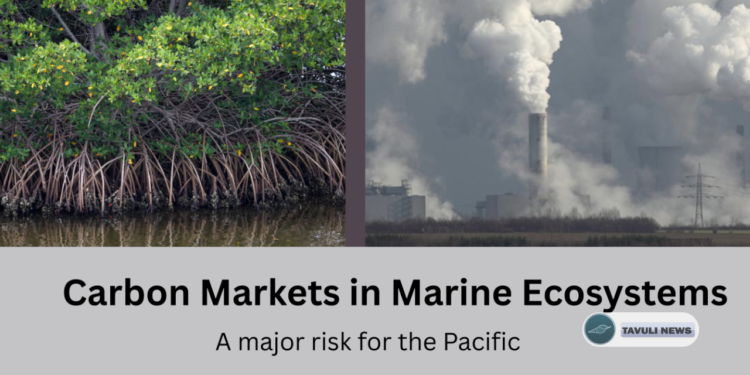PANG warns that carbon markets in oceans fail to reduce emissions and harm Pacific communities’ rights.
The Pacific Network on Globalisation (PANG) has raised concerns about the growing trend of high-emitting countries and large corporations commercializing marine ecosystems, which has led to the introduction of carbon markets in oceans. PANG warns that carbon markets have not proven effective in reducing emissions or providing reliable financing for developing countries.
This caution comes alongside the launch of the report, “Blue Herrings: Carbon Market Lessons for Blue Carbon Frontiers,” which coincides with the Pacific Oceans Alliance Ministerial meeting in Suva, where leaders are discussing the future of the region’s oceans.
PANG has expressed concerns about the inclusion of marine ecosystems in carbon markets, asserting that they fail to both reduce emissions and generate stable financial support. The report, which critically assesses academic research, expert analysis, and community experiences with land-based carbon schemes, found that carbon markets do not meet their intended goals.
India Logan-Riley, PANG’s Climate Justice Campaigner, explained that the expansion of market-based approaches into Pacific marine environments could exacerbate land tenure conflicts. The introduction of such incentives risks disrupting customary resource governance. Fisherfolk groups have already raised concerns about the potential impact on marine tenure and Indigenous subsistence practices, underscoring the need for Pacific governments to carefully reconsider this approach.
The report also highlights how carbon markets are vulnerable to market dynamics, including price fluctuations, product demand, and project viability. These factors could have significant disruptive effects on the potential income streams from carbon projects, as has been observed in the sovereign bonds market and the history of carbon markets.
Dr. Rufino Varea, Regional Director of the Pacific Islands Climate Action Network (PICAN), reaffirmed the concerns of Pacific communities, calling the expansion of carbon markets into the ocean a “false solution.” He added that these schemes allow major polluters to delay the fossil fuel phaseout and evade their obligations to provide real, grant-based climate finance. Varea further emphasized that carbon markets threaten Indigenous rights and divert attention from the urgent action needed in the region. PICAN is advocating for community-led solutions that respect Pacific sovereignty and prioritize meaningful climate action.
The report stresses that carbon markets, originally not designed as a long-term solution, have taken center stage in climate policy discussions, diverting resources and focus away from genuine emissions reductions. Expert analyses and community experiences show that carbon markets fail to reduce emissions or offer the financial stability needed for Pacific communities.
Logan-Riley concluded, “The real win-win solutions are grant-based finance and measures that prevent further fossil fuel exploitation. Carbon markets present too great a risk of worsening the climate crisis, which would increase the burden already carried by Pacific countries.”
Frances Namoumou, Ecumenical Animator for Ecological Stewardship and Climate Justice at the Pacific Conference of Churches (PCC), also weighed in, saying, “The ocean is a sacred blessing, and we must stand against false solutions like carbon markets. We need to focus on real climate action that protects our ocean and supports our communities.”
Logan-Riley further cautioned, “The findings in this report should serve as a timely warning to Pacific Islands governments and communities considering the sale of marine carbon offsets. Market-based approaches for generating revenue are too unstable to meet the development needs of the Pacific. We urge extreme caution with regard to the expansion of blue carbon.”
Source: PANG















































































